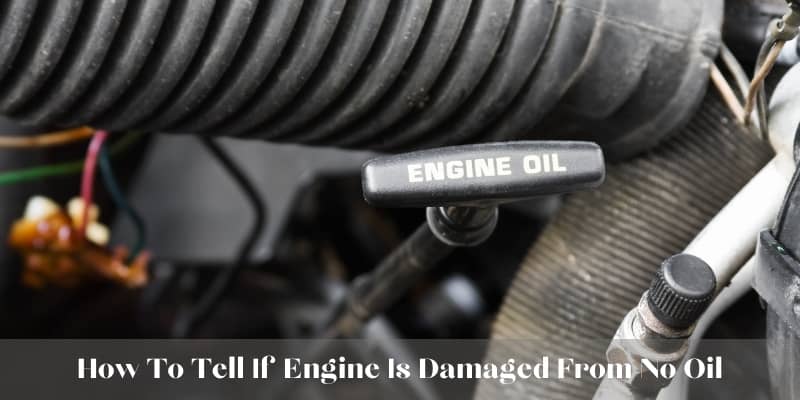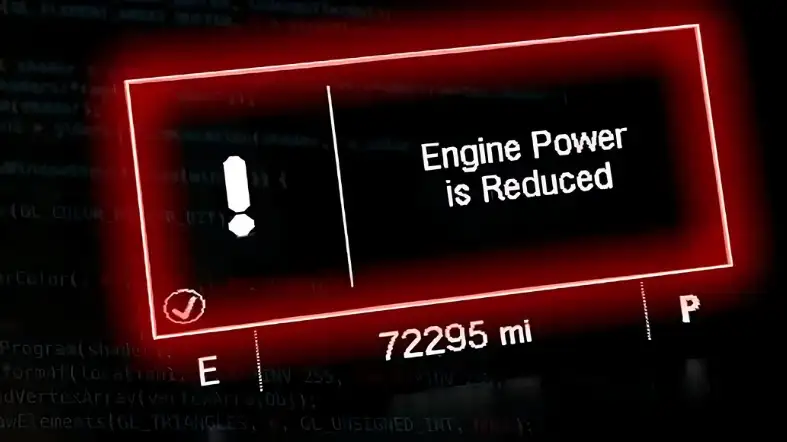Discover the crucial signs that indicate engine damage due to oil depletion.
Neglecting oil maintenance can lead to increased fuel costs, reduced driving efficiency, and severe engine damage.
By recognizing these warning signals, you can save your vehicle from expensive repairs and ensure optimal performance.
Learn how to identify these signs and take proactive steps to maintain your engine’s health.

10 Significant Signs of How to Tell If Engine is Damaged From No Oil
If you notice these 10 signs, you have to change your vehicle’s oil immediately. The signs are:
1. Turning on the Warning Light of Oil Pressure:
You have found a lot of light on your car’s dashboard monitor. From all the lights, one light shows the warning of oil pressure.
Though there are many lights, you know the warning light of oil pressure showcasing light if you are a pro driver.
However, if you are a beginner in driving, notice a light similar to an oil can that is showing the warning of oil level.
If the light is turning on, you have to think your car’s oil is going low or there is no oil in the oil tank.
2. Less Amount of Oil:
Before, we talked about a light that shows a warning of oil. But on your car’s dashboard, another light indicates the oil level.
You can observe oil consumption, and the rest of the oil level by frequently noticing the light. It will help you to change the oil and avoid engine damage.
Yes, low oil indicating light can be different according to the car’s model.
3. A Lousy Oil Burning Smell:

If you notice the new oil color, you will find its color is similar to honey. And it is almost as thick as honey.
But when you used oil for a long time, like more than three months or above 3000 miles, the oil burned too much. As a result, it reduces its efficiency.
Even if you didn’t check the oil tank for that period, there may be a leak to the tank to its surroundings and dripping oil from there to the hot engine.
These are the two possibilities for what you feel like an oil-burning smell. If so, your car may face sudden engine failure.
4. Horrible Noise:
Naturally, oil lubricates all the engine elements and reduces metal contraction sound and metal corrosion.
But when the metals don’t get enough lubrication from oil and come to touch one another, they start creating a horrible sound like a grinding machine.
If this is continuously happening with your car’s engine, it will damage within a very short time, and you need to change it.
5. Losing Oil’s Original Color:
When you don’t change the oil for a long time and use the same oil to run the engine, the oil loses its original color and gets dark.
Why has oil lost color? Oil loses color and gets dark due to excessive heat and some of the metal particles and debris.
When the engine pumps oil to run the car, metals are fractioned, and some metal particles mix up with the oil. Thus it loses its original color.
6. Decrease the Engine’s Performance Level:

When the oil tank of your car is full, the engine works like horsepower. But as time passes and the oil level is decreased, or there is no oil, your engine’s efficiency will decrease.
So if you notice this type of car’s issues, you may think there must be an oil-related problem.
The less the engine works, the less the oil level, and the increase the engine damage.
7. Quick Engine’s Overheating Problem:
It is natural when the engine works; it will get some heat due to metal-to-metal friction.
But it has an adequate limit and doesn’t mean overheating. If there is no oil, the metals don’t get enough oil to be slippery.
If they get too much friction with each other, the engine will get overheated.
An overheating engine won’t last long, and if you drive an overheating engine, you don’t get efficient performance.
So when you face this, it will be an excellent decision to take some time to get it cool. After cooling down the engine, check out the oil; if it needs to change the oil, then immediately change it.
8. Too Much Smoke:
When a car is running, creating smoke is natural, and this smoke is also invisible.
Maybe you have noticed engines that use gas produce less smoke than diesel engines.
Even perhaps you see the smoke-like cloud in winter. All that smoke is mainly vapor of water, not genuine smoke.
But if your car’s engine has no oil or has a little oil, it starts producing different smoke colors.
It is a warning if your engine produces bluish exhaust, it damages your engine severely.
There is another reason for creating too much smoke: the wrong air-to-fuel ratio.
If the air and the fuel ratio don’t match, the engine starts to produce much exhaust, and your engine will be damaged proportionately.
9. Extravagant Mileage:

Sometimes you take too much workload on your shoulders, which is also true to your car’s engine.
You don’t give some rest to your car. Your car is getting you for office, for home, for long driving, shopping, and so on.
If it is happening with your car’s engine, it needs to check in oil level.
When you drive your car mile after mile and don’t take any care or don’t check adequate oil, the engine gets an excessive temperature than regular use and loses engine efficiency.
10. Car Stalling:
As technology is going to advance, so the automobile companies are also going to grow.
Some automobile-making companies include some engine failure savings to protect your car’s engine from any damage to the adverse situation.
Automatic engine shutdown is one of the aforementioned features that can save your engine from severe damage due to no oil.
Though it protects your engine, it may damage your car’s pistons, headlight, and other essential components of your vehicle.
Note: This feature is not right for all the models of automobiles.
How Can You Save The Engine From Damage?
Sometimes, there is a simple solution near you, but you can’t recognize it. It is happening this time with you when you are taking too much tension about the engine health. Some instructions to protect your engine from quick damage
- Know the no oil in car symptoms
- Always check signs of the engine going bad.
- Do regular and essential car maintenance work.
- Frequently change oil and use the best oil, which is instructed by the manufacturer.
- Don’t drive your car anymore if you notice one of the above signs without the settlement.
- If you can do them by yourself, it is okay. But if you can’t, don’t forget to take help from any professional mechanic.
Wrap Up
Your car is more than a mode of transportation; it’s an investment in convenience and efficiency.
Neglecting its maintenance, particularly oil changes, can compromise its performance and longevity.
Recognizing the 10 crucial signs of engine distress due to oil depletion empowers you to take proactive measures.
Regular oil changes and vigilant observation are the keys to preserving your car’s heart and ensuring a seamless driving experience.
Prioritize maintenance for a vehicle that’s as reliable as it is enjoyable.
FAQ
Can running an engine with low oil levels cause permanent damage?
Yes, running an engine with consistently low oil levels can cause permanent damage. It leads to increased friction and heat, which can result in the engine’s internal components wearing out or seizing.
What happens if I ignore the low oil warning light?
Ignoring the low oil warning light is risky. It signifies a drop in oil pressure, which can lead to inadequate lubrication and severe engine damage. Continued driving without addressing this warning can result in costly repairs or engine replacement.
Can an engine seize if it runs out of oil?
Yes, an engine can seize if it runs out of oil. When there’s no oil to lubricate the moving parts, friction, and heat build up, causing components to weld together or become irreversibly damaged.
How often should I check my vehicle’s oil level?
It’s a good practice to check your vehicle’s oil level regularly, ideally once a month or before long trips. This simple routine can help you maintain proper oil levels and prevent potential engine damage.
Conclusion
Ultimately, taking proactive steps to maintain proper oil levels and being vigilant about the signs of engine damage can prolong the life of your vehicle and ensure its continued reliability on the road.
Your engine’s well-being is in your hands, so stay attentive and keep your vehicle running smoothly.
